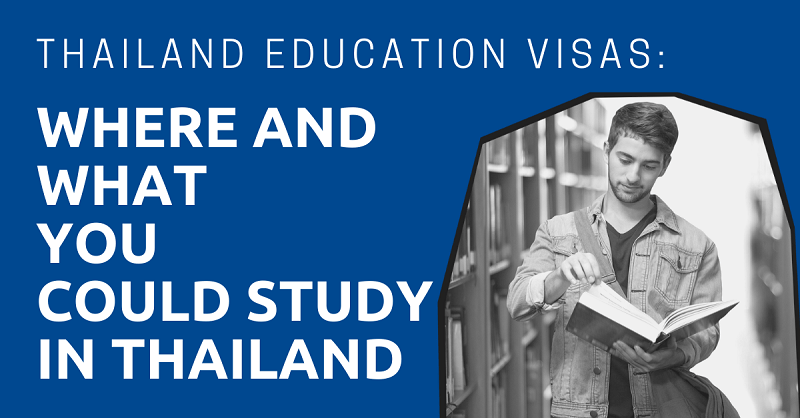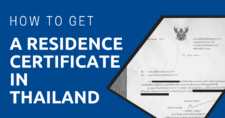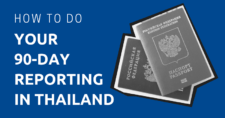
The Thai education visa. It’s not just for learning Thai. Despite popular belief, you can come to Thailand to study a wide array of subjects at many different places throughout the country. But the place and subject must be recognized by Thailand’s Ministry of Education.
So if you have your sights set on studying languages, martial arts, cooking, or other specialties in Thailand, here’s how you can apply for an education visa.
Join ExpatDen Premium and discover the tips and tricks that long-term expats have used to qualify for a variety of Thai visas. With your membership, you get immediate and unlimited access to our library containing hundreds of exclusive guides that will help you move to and live in Thailand. You’ll discover how to:
- apply for a Thai visa on your own
- effectively prepare your visa documents so you don’t raise any eyebrows at the immigration office
- secure one of the secret education visas
…and so much more!
"*" indicates required fields
Disclaimer: This article may include links to products or services offered by ExpatDen’s partners, which give us commissions when you click on them. Although this may influence how they appear in the text, we only recommend solutions that we would use in your situation. Read more in our Advertising Disclosure.
What Is It?
The non-immigrant visa ED, or education visa as it’s commonly called, lets non-Thais study in a Thai university or similar educational setting, intern at corporations, take observation tours, participate in official projects or seminars, attend conferences or training courses, or study as a Buddhist monk in Thailand.
The education visa for learning Thai is a popular choice for those who want to stay in Thailand but aren’t eligible for other Thailand visas.
But this doesn’t work well anymore since Thai authorities are cracking down on the issue. Unless you really want to learn Thai and actively attend class, if you sign up for classes just for the visa you would put yourself at risk of getting banned from Thailand.
It’s better to go with a legal option like the Thailand Elite Visa.
What Are the Requirements?
If you want an education visa, the only requirements you need to meet are those listed above. But the place where you’re studying or training at, or the subject you’re studying, has be recognized by Thai Embassy.
If you come from Bangladesh, China, India, Sri-Lanka or the Middle Eastern or African countries then you’ll have to apply for a visa only at the Thai Embassy or Consulate-General in your home country or at the Thai Embassy assigned to your country.
Some Chinese nationals can get an education visa from the Vientiane embassy. But if you want to be certain, it’s best to contact the embassy you’re planning to get a visa from.
Studying in Thailand
A non-immigrant ED visa is one of the best avenues to explore if you’re looking to study at a university in Thailand for one year or longer. But the school you study at or the subject you study have to be approved by Thai Immigration. And you may need to attend a certain amount of classes each week.

Language
Most language schools in Thailand require you to enroll before they process your visa. Once you pay for course fees, they’ll send a letter of admission and/or a letter of introduction to the Ministry of Education on your behalf. This could take up to three weeks.
In my experience with applying for an education visa, I was advised by the language school to get a tourist visa to “refresh my visa status” so that I would have at least sixty days while waiting for the Ministry of Education’s approval.
Some Thai language schools provide guidelines on an education visa’s length of stay based on an applicant’s study program, which can provide you a visa from three months up to one year, in three-month increments.
There may be instances when immigration officers visit the school to check if you’re attending classes, but these are rare occurrences.
And not all language schools are recognized by the Ministry of Education. Many schools were caught giving foreigners visas without requiring them to attend class. If your school offers you this option, they’re not a school. They’re a visa mill. I’d find another school asap.
You can check the legitimacy of a language school based on the following factors:
- Teacher’s qualifications: A teacher who has a relevant language degree is a giveaway that he or she can teach; legitimate schools often provide this information.
- Learning premises: One way to check the legitimacy of the school is to drop by and see if they conduct classes; those without a classroom might be a visa mill registered as a school.
- Learning methodology and curriculum: Learning materials such as books and some visual aids are usually provided, with a course scope—listening, speaking, reading, writing–all outlined with a corresponding number of study hours. A visa mill school may also provide such materials, but some may not.
Other signs to watch out for are the school’s attendance records and its admin’s knowledge of the Thai Education Visa process. If you’re looking for a reputable Thai language school, check out our article on learning Thai.
Also keep in mind that you can study other languages in Thailand as well, such as Chinese, Russian, or English. But in some cases, you might need to meet a minimum number of study hours or classes per week. For example, you might have to take two lessons per day at four to five days per week.
If you’re looking for something a bit more physical, consider the following options.
Martial Arts
For those looking to study in Chiang Mai, the education for hand-to-hand combat beats getting a language education visa—no pun intended. Training for these courses is held by the Thai Military Police, which makes it more legitimate as well.

You can apply for this visa from your home country. But if you need help, Chiang Mai Locals offers hand-to-hand combat visa helps.
Chiang Mai Buddy also offers a similar program.
Another great option for those looking for a more physically demanding visa is to study Muay Thai in Thailand. Chacrit Muay Thai offers a one-year education visa.
Many other Muay Thai gyms offering similar visas have been popping up with the rise in popularity of Muay Thai in Thailand. So be sure to do some research before picking the right gym for your needs.
Cooking
Another option for getting an education visa is to enroll in a culinary institute. Thai culinary schools provide instructions for education visa application, whether it’s an international school like Le Cordon Bleu or a smaller cooking company such as Bangkok Thai Cooking Academy.

Other
You can get an education visa through other less-popular options as well, such as for studying the art of Thai massage or for scuba diving.
You can also study Thai Traditional Yoga massage at this Chiang Mai school, which offers a helpful guideline on applying for your visa.
Taking these courses, however, comes with a set of guidelines different from those of enrolling in a Thai university versus enrolling in short-term courses such as language or cooking lessons or martial arts. So be sure to ask your school what their requirements are.

Studying these subjects isn’t the only way to get a Thai education visa. There are some other scenarios that may entitle you to a similar visa. Check out our premium subscription to find out how if you can get an education visas for your current situation.
How to Apply
If you want to apply for an education visa, you can do so from either your home country, or if already in Thailand with a tourist visa, from a Thai Embassy in a neighboring country.
Here are the documents you’ll need, where to apply, how much it’ll cost, and how long you’ll have to wait for your visa.
Documents
This list of documents was taken from the Thai Embassy’s website. But like with so many visa application processes in Thailand, the list of required documents changes depending on the immigration officer you see.
- passport or travel document with validity not less than six months and two blank pages on both side
- visa application form completely filled out
- 4cm x 6cm photo taken in the last six months
- recommendation letter addressed to the Thai Embassy or Consulate
- letter of acceptance from the academic institute or organization
- for those wishing to study in a private institution, an official letter from the Ministry of Education of Thailand, or other sub-authorities concerned, approving the enrollment of foreign students, and a copy of registration certificate of the academic institute
- academic record and the student ID, if currently studying
- for those wishing to attend seminar, or training session, or internship, a recommendation letter from the institution addressed to the Consulate is also required
Cost
The fee for an education visa is 1,900 baht, and you’ll have to pay that amount every three months when you extend your visa.
How to Extend
When you’re ready to extent your education visa, you’ll have to go through the same process that you did when you first applied. If you’re from one of the countries that requires you to leave Thailand to initially apply for an education visa, but you’re already in Thailand with your first three-month education visa, you won’t have to leave the country to re-apply.
The only difference this time around is that during your interview with the immigration officer, they may give you an oral or written exam to assess your progress if your visa is for learning Thai.
Basically, it helps them determine whether you’re attending your classes or not, and whether you’re using your education visa to study and not just as a means to stay longer in the country.
Many Thai language schools inform their students about the written or verbal tests being enforced, and often include this info on their website.
Your answers to the test may make the difference between getting a 60-day extension, a 30-day extension, or no extension at all–meaning you’ll have seven days to leave Thailand.
Now, on to You
If you want to get an education visa, or non-immigrant visa ED, in Thailand, be sure to find an institution and subject that has been approved by Thailand’s Ministry of Education. The subjects and places you can study in Thailand plentiful, and only limited to your interests.
Want to find out other options? Check out our in-depth guide to Thailand visas.








Hello, I hope this thread is still active.
I just contacted two Ministry-approved language schools in Bangkok, GEOS and PRO. Both said they have an age limit for the ED visa application. GEOS said applicants cannot be over 50, and PRO said 48. (I am 54 years old.)
Both schools told me they are following “Ministry rules”. Something strange is going on here. For one, those two schools have a different age limit, which tells me it is arbitrary. Then, I looked up TSL school in Chiang Mai (where I have previously studied), and their website says there is no age limit for the ED visa (unless you are over 90).
Can anyone tell me what the Thai Ministry of Education rule is, and why some language schools are imposing an age limit for the ED visa? From everything I’ve read online, there should not be an age limit for the ED visa.
Thanks in advance for the help!
Chang
It’s really worth doing your research before joining a language school. One year of study is a long time. You don’t want to be stuck with a school that doesn’t fit your learning goals and lifestyle. My advice is to be as proactive as possible before signing up.
The article above is correct in saying that schools are different in the way they administer your visa and teach and test your Thai language progress. Some are very well organised and others rely on you to read notices and take action. This may be reflected in their schedule of fees.
Tips to evaluate what language school is best for you:
1) In the first instance, look for schools close to your accommodation. Then visit each school and work out transport routes and parking. How long will it take you to get there if the class starts at 9 am?
2) Request to sit in on a class. Without being nosey, ask current students how long was it before they could converse with Thai people. Ask them to speak some Thai to you. How confident are they? Ask about their curriculum and how often they are tested. Is there homework and how much?
3) What are the teachers expectations? Do they check your progress and assume you will learn what they are teaching immediately without constant revision?
4) Is there auxiliary actives planned? Are the lessons supported online if you need to leave your city? Are the online lessons recorded so you can view them in your own time?
5) What is the schools teaching method? Do they concentrate on training your ear to hear the tones first or do they begin with reading and writing with consonants and vowels. This could have an impact on your level of motivation as learning grammar is tough going.
6) There are many different types of transliterations aka anglicise Thai words. What ‘system’ do they use? And more importantly, when do they stop using transliterations (which are like training wheels on a bike and can handicap progress if kept on too long).
6) Are there shops close by for a bite to eat?
Yes, all this takes time. But the investment will pay off handsomely when you can order the food you want and chat with a Thai about their beautiful country.
I am moving to Thailand August 2021 and am looking at visa options. I know that while I am there I want to learn kiteboarding, but it’s hard to find on Google if that is acceptable for an education visa. I am willing to sign up for a course because I do want to learn and will invest in this. Is kiteboarding school a thing for an education visa?
I’ve never heard about it before. And I would doubt you can make an education visa from a kiteboarding course since it’s usually a one-day course. The longest course I have seen so far is only a 3-day course.
Anyway, please keep us posted if you can find some.
My husband has valid work permit under Non- Immi B visa and my son is allowed to live in Thailand under Non-Immi O visa (Dependent visa). He is a student of Monash University, Australia and his classes will be resumed hopefully on July 2021.
However, my son’s visa will be expiring on 22nd November, as he will be turned to 20 years old then. According to Thai immigration policy, after 20 years, he is not able to stay with us under dependent visa.
He is in Bangladesh now, can he applly for student ED visa by enrolling himself in a language scholl or cooking school?
Please advise. Thanks in advance.
The visa situation in Thailand is different now because of COVID-19. Currently you might not be able to get an education visa from the language school or a cooking class. I would recommend you to contact them directly and find out. You can find a list of language school in Bangkok here: https://www.expatden.com/thailand/language-school-bangkok/
Also, I would contact the immigration office directly to find out an option for your son as well. My assumption is that once your son’s visa is expired, he should still be able to stay in Thailand under the visa amnesty. And by the time he can’t do that anymore, he should be able to make an education visa through a language school.
Do you know if there is a music education that provides Visa?
Do you know what kind of educations I can do in Pai?
Hello,
Thank you for the helpful article!
Could you recommend some scuba diving school with which you can apply for the education visa?
There are a lot of scuba diving schools here in Thailand (eg. in Koh Tao). I believe a lot of them should be able to provide the education visa. They usually call it “internship program”
Hello,
Thanks for the info.
Here is my situation:
First, I entered Thailand on Jan 2018 on a METV which expired July 2018. I then took beginning Thai at ProLanguage in BKK in Aug 2018-May 2019.
I then went back to the US for my nephew’s graduation and came back on a 30-day visa on arrival before getting a second ed visa for Beginning Chinese (ends April 1, 2020).
Because I will apply for a retirement visa in November 2020, I have to fill 7 months to continue my stay in Thailand.
I would like to get another ed visa for intermediate level Thai at a respectable language school.
ProLanguage told me many of their continuing students are being rejected.
I am considering Walen or Duke but after talking with a Walen rep they told me I can apply… but they still can not guarantee if I will be accepted because some immigration officers or Embassies are rejecting regardless of their school or program.
Does anyone have any recent first-hand experience for improving my chances of getting another ed visa so I can actually be fluent in Thai?
Would it be better to go to a University like Chula or Bangkok University given that they offer long-term programs to foreigners?
By the way, I think I’ve read somewhere that there are people who get 3rd-4th ed visa. How?
I hope you can.
Thank you.
I will be 66 years old when I move to Chiang Mai in 2020. I want to get an education visa to learn Thai language and culture first before considering the retirement visa. CMU posted that their language courses were for people 50 and younger. Do you think I will have trouble finding a language school willing to teach an old dog?
It’s the first time I hear of an age limit. I wonder if it’s related to some misconceived notion that you can’t learn the language anymore, or (which I think to be more likely), that immigration is giving them a hard time for education visas. The visa issue aside, I’ve never seen a language school enforcing an age limit for participants and I’d be confident you can find a class that’ll teach out.
Have you considered just getting a multiple entry tourist visa for the first few months to test things out?
An METV is a consideration but my goal is to stay in Thailand until I die. I want to integrate into the culture so I don’t need to totally depend on the kindness of others. Of course your kindness is appreciated.
Good point and good long-term strategy, though to keep things easy and to have the greatest possible success in learning Thai you might want to consider doing the first round on a tourist visa and switch to another visa type later on. Relying on a language school to sponsor a visa means your choices are more limited as to where you can study. In the end though, both options are likely to work out well.
Hi there, do you know of any courses offered in Thailand in ceramics or pottery where I could get a Ed visa also? Darren
You can check out this school: http://www.somceramics.com/Default.aspx
But I’m not sure whether they can provide the education visa or not since the course might not be long enough for a visa.
Your wrong about the 3 month/1900 baht fee. If you are enrolled at a university it is 1900 baht year by year as long as you attend and pay the tuition.
thank you